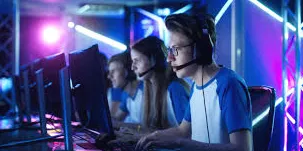Introduction to Esports Competitor Skills
Esports is more than entertainment. It’s a rapidly evolving global competition that demands a blend of cognitive finesse and technical precision from its top players. As the scene grows, understanding the unique skillset required for success is increasingly crucial for those aspiring to professional gaming careers.
Mental agility and quick decision-making define the esports elite. While reflexes are crucial for victory, strategy and adaptability often separate champions from the rest. Immersing oneself in the world of esports provides not only entertainment but deep insights into collaboration, problem-solving, and leadership in the digital age. Nolan Rosen esports competitor, demonstrates how dedication, consistent practice, and strategic thinking come together to achieve success at the highest levels.
The discipline required to excel extends beyond gameplay. It’s reflected in daily routines, rigorous practice schedules, and ongoing team communication. Esports athletes must constantly update their tactics to counter evolving metagames, opponent playstyles, and frequent game patches, all while maintaining peak mental and physical health.
Understanding this journey helps pave the way for a new generation of players to enter the scene equipped with essential skills and strategies. Aspiring competitors and fans alike benefit from learning what sets the champions apart, both individually and as members of high-performing teams.
Essential Skills for Esports Athletes
- Hand-Eye Coordination: Esports titles require mastery of complex controls and lightning-fast reactions, especially in games like League of Legends, Counter-Strike, and Valorant. Every move matters, and the margin for error is razor-thin.
- Strategic Thinking: Success isn’t just about reaction time—it’s about outwitting the opposition. Top-tier players continually anticipate opponent moves, analyzing game states in real time to create winning opportunities.
- Team Collaboration: Communication forms the backbone of team-based competitions. Whether initiating a coordinated attack or executing a defensive maneuver, teamwork is critical to capitalize on competitive advantages and recover from setbacks.
- Mental Resilience: The pressures of competition demand stable focus and the ability to rebound from losses quickly. Mindset separates champions from challengers and keeps successful players at the top of their game.
Developing Winning Strategies
High-performing esports teams are distinguished by their tactical depth and adaptability. Coordinated team fights, map control, vision placement, and resource management are just a few strategic pillars that set top teams apart. These maneuvers demand countless hours of deliberate practice, building synergy and trust among team members.
Utilizing data-driven analysis allows teams to adjust their approach based on in-game metrics. Reviewing previous matches, analyzing opponent strategies, and leveraging statistical breakdowns help refine tactics and identify performance trends. This constant feedback loop ensures teams remain at the forefront of competitive play.
The Role of Coaching and Mental Health Support
Behind every great team is a dedicated coaching staff. Coaches guide their players through tactical reviews, provide constructive feedback, and instill critical habits for personal and team improvement. Their responsibilities also extend to developing tailored practice routines and promoting player well-being. The demanding schedule and high stress of esports can impact mental health. To counter burnout, anxiety, and stress, an increasing number of teams incorporate mental health professionals into their support staff. Addressing psychological needs is now seen as essential to achieving long-term success and sustaining high performance.
Technological Advancements in Player Performance Analysis
Technology continues to revolutionize player training and performance evaluation. AI-driven analytics frameworks like PandaSkill leverage machine learning to provide detailed breakdowns of individual player contributions, enabling more accurate skill assessments and fairer comparisons across roles. This technology-driven approach empowers teams to tailor their training programs and objectively evaluate both individual growth and team cohesion.
Esports in Education
Educational systems are increasingly integrating esports to foster digital literacy, teamwork, and social-emotional skills. According to a report by EdTech Magazine, esports programs are helping students improve their grades while building leadership abilities, showing that gaming can be both educational and developmental. These programs are not only inclusive but also empower students with a sense of community and belonging.
Conclusion
Esports competitors are celebrated for a suite of skills that extend well beyond rapid reflexes. Success is rooted in strategic thinking, teamwork, mental toughness, and a willingness to adapt. By learning from the triumphs of established teams, embracing technological innovations in performance analysis, and prioritizing mental health, the next generation of competitors can carve a path toward esports greatness.



